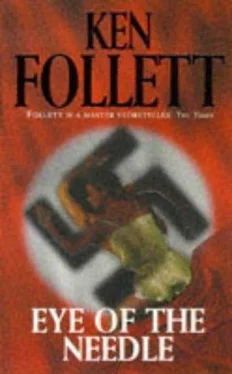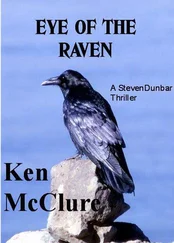They stood at the edge of the piazza. Parkin nodded at the town hall. "Did you go inside that place, Smiler?"
"Yes, sir."
"Looks like the village is ours, then."
"Yes, sir."
Parkin stepped forward to cross the piazza, and then it broke. There was a crash of rifles, and bullets hailed all around them. Someone screamed. Parkin was running, dodging, ducking. Watkins, in front of him, shouted with pain and clutched his leg. Parkin picked him up bodily. A bullet clanged off his tin hat. He raced for the nearest house, charged the door, and fell inside.
The shooting stopped. Parkin risked a look outside. One man lay wounded in the piazza: Hudson. Hudson moved, and a solitary shot rang out. Then he was still. Parkin said, "Fookin' bastards."
Watkins was doing something to his leg, cursing.
"Bullet still in there?" Parkin said.
Watkins yelled, "Ouch!" then grinned and held something up. "Not any more."
Parkin looked outside again. "They're in the clock tower. You wouldn't think there was room. Can't be many of them."
"They can shoot, though."
"Yes. They've got us pinned." Parkin frowned. "Got any fireworks?"
"Aye."
"Let's have a look." Parkin opened Watkins' pack and took out the dynamite. "Here. Fix me a ten-second fuse."
The others were in the house across the street. Parkin called out "Hey!" A face appeared at the door. "Sarge?"
"I'm going to throw a tomato. When I shout, give me covering fire." Right now Parkin lit a cigarette. Watkins handed him a bundle of dynamite. Parkin shouted, "Fire!" He lit the fuse with the cigarette, stepped into the street, drew back his arm, and threw the bomb at the clock tower. He ducked back into the house, the fire of his own men ringing in his ears. A bullet shaved the woodwork, and he caught a splinter under his chin. He heard the dynamite explode.
Before he could look, someone across the street shouted, "Bullseye!"
Parkin stepped outside. The ancient clock tower had crumbled. A chime sounded incongruously as dust settled over the ruins.
Watkins said, "You ever play cricket? That was a bloody good shot."
Parkin walked to the centre of the piazza. There seemed to be enough human spare parts to make about three Germans. "The tower was pretty unsteady anyway," he said. "It would probably have fallen down if we'd 'ave sneezed at it together." He turned away. "Another day, another dollar." It was a phrase he'd heard the Yanks use.
"Sarge? Radio." It was the R/T operator.
Parkin walked back and took the handset from him. "Sergeant Parkin."
"Major Roberts. You're discharged from active duty as of now, Sergeant."
"Why?" Parkin's first thought was that they had discovered his true age.
"The brass want you in London. Don't ask me why because I don't know. Leave your corporal in charge, and make your way back to base. A car will meet you on the road."
"Yes, sir."
"The orders also say that on no account are you to risk your life. Got that?"
Parkin grinned, thinking of the clock tower and the dynamite. "Got it."
"All right. On your way. You lucky sod."
Everyone had called him a boy, but they had known him before he joined the Army, Bloggs thought. There was no doubt he was a man now. He walked with confidence and grace, looked about him sharply, and was respectful without being ill at ease in the company of superior officers. Bloggs knew that he was lying about his age, not because of his looks or manner, but because of the small signs that appeared whenever age was mentioned-signs that Bloggs, an experienced interrogator, picked up out of habit.
He had been amused when they told him they wanted him to look at pictures. Now, on his third day in Mr Middleton's dusty Kensington vault, the amusement had gone and tedium had set in. What irritated him most was the no-smoking rule.
It was even more boring for Bloggs, who had to sit and watch him.
At one point Parkin said, "You wouldn't call me back from Italy to help in a four-year-old murder case that could wait until after the war. Also, these pictures are mostly of German officers. If this case is something I should keep quiet about, you'd better tell me."
"It's something you should keep quiet about," said Bloggs.
Parkin went back to his pictures.
They were all old, mostly browned and fading. Many were out of books, magazines, and newspapers. Sometimes Parkin picked up a magnifying glass Mr Middleton had thoughtfully provided, to peer more closely at a tiny face in a group: and each time this happened Bloggs' heart raced, only to slow down when Parkin put the glass to one side and picked up the next photograph. They went to a nearby pub for lunch. The ale was weak, like most wartime beer, but Bloggs still thought it wise to restrict young Parkin to two pints. On his own he would have sunk a gallon.
"Mr Faber was the quiet sort," Parkin said. "You wouldn't think he had it in him. Mind you, the landlady wasn't bad looking. And she wanted it. Looking back, I think I could have had her myself if I'd known how to go about it. There, I was only eighteen."
They ate bread and cheese, and Parkin swallowed a dozen pickled onions. When they went back they stopped outside the house while Parkin smoked another cigarette.
"Mind you," he said, "he was a biggish chap, good-looking, well-spoken. We all thought he was nothing much because his clothes were poor and he rode a bike and he'd no money. I suppose it could have been a subtle kind of disguise." His eyebrows were raised in a question.
"It could have been," Bloggs said.
That afternoon Parkin found not one but three pictures of Faber. One of them was only nine years old. And Mr Middleton had the negative.
Heinrich Rudolph Hans von Müller-Güder (also known as Faber) was born on May 26, 1900, at a village called Oln in West Prussia. His father's family had been substantial landowners in the area for generations. His father was the second son; so was Heinrich. All the second sons were Army officers. His mother, the daughter of a senior official of the Second Reich, was born and raised to be an aristocrat's wife, and that was what she was.
At the age of thirteen Heinrich went to the Karlsrühe cadet school in Baden; two years later he was transferred to the more prestigious Gross-Lichterfelde, near Berlin. Both places were hard disciplinarian institutions where the minds of the pupils were improved with canes and cold baths and bad food. However, Heinrich learned to speak English and French and studied history, and passed the final examinations with the highest mark recorded since the turn of the century. There were only three other points of note in his school career: one bitter winter he rebelled against authority to the extent of sneaking out of the school at night and walking 150 miles to his aunt's house; he broke the arm of his wrestling instructor during a practice bout; and he was flogged for insubordination.
He served briefly as an ensign-cadet in the neutral zone of Friedrichsfeld, near Wesel, in 1920: did token officer training at the War School at Metz in 1921, and was commissioned Second Lieutenant in 1922.
("What was the phrase you used?" Godliman asked Bloggs, "German equivalent of Eton and Sandhurst?")
Over the next few years he did short tours of duty in half a dozen places, in the manner of one who is being groomed for the general staff. He continued to distinguish himself as an athlete, specialising in long-distance running. He made no close friendships, never married, and refused to join the National Socialist party. His promotion to lieutenant was somewhat delayed by a vague incident involving the pregnancy of the daughter of a lieutenant colonel in the Defence Ministry, but eventually came about in 1928. His habit of talking to superior officers as if they were equals came to be accepted as pardonable in one who was both a rising young officer and a Prussian aristocrat.
Читать дальше












